|
|
|
Sort Order |
|
|
|
Items / Page
|
|
|
|
|
|
|
| Srl | Item |
| 1 |
ID:
156245
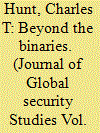

|
|
|
|
|
| Summary/Abstract |
The multiplicity of sources of security and justice in post-colonial states are often categorized according to a series of fixed analytical binaries. Such reductive dichotomies often mask the fluid and evolutionary ecology of these highly networked actors. As a result, the ways in which they co-produce social order are seldom well-understood and the ramifications for peacebuilding remain underexplored. This article examines the relationships between myriad providers of security and justice. Using examples from fieldwork in West Africa, it presents a case for a relational approach to peacebuilding that introduces the concept of symbiosis to develop a framework for evaluating these relations. It argues that the framework and conceptual steps involved create important opportunities for both new research and emerging practices of peacebuilding.
|
|
|
|
|
|
|
|
|
|
|
|
|
|
|
|
| 2 |
ID:
156246
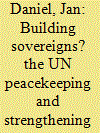

|
|
|
|
|
| Summary/Abstract |
This paper contributes to the debate on the recent ‘stabilization turn’ in United Nations (UN) peacekeeping by inquiring into a changing set of practices by which the UN intends to ‘strengthen the authority of the state.’ Drawing on Piiparinen’s notion of sovereignty-building as an emerging paradigm of conflict management, the study analyses the support for state authority and sovereignty in two modalities of contemporary UN peace operations – UNIFIL II and MINUSMA. While the two analysed missions significantly differ when it comes to the extent of their tasks, or the rules for the use of force, they both highlight the importance of local politics and agency in the implementations of their mandates and the need to strike a compromise between the contending visions on what form of sovereignty should be supported. By doing so, the paper points out the importance of ‘local’ and contextual emergence of the practices of sovereignty-building.
|
|
|
|
|
|
|
|
|
|
|
|
|
|
|
|
| 3 |
ID:
156244
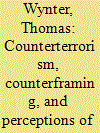

|
|
|
|
|
| Summary/Abstract |
Research on post-9/11 counterterrorism policy preferences in the West has focused primarily on the role of emotions and the magnitude of threat perception. In this article, I demonstrate the central role played by perceptions of the nature of the terrorist threat. Specifically, I focus on the divergence between the dominant depiction of terrorist irrationality in elite discourse in Australia and the strategic model in the academic literature. Reporting on the results of a randomized survey-experiment (N = 803), I find that exposure to excerpts from the academic literature significantly increases perceptions of terrorist rationality. Perceptions of terrorist rationality, in turn, correlate with lower levels of support for military responses to terrorism. While exposure to descriptive text about a terrorist attack increases support for military responses to terrorism, subsequent exposure to excerpts from the academic literature mitigates this effect, reducing support for military responses to terrorism.
|
|
|
|
|
|
|
|
|
|
|
|
|
|
|
|
| 4 |
ID:
156238


|
|
|
|
|
| Summary/Abstract |
The research articles in this issue demonstrate different approaches to creative research in security studies. Our first article by Kathryn Alexander demonstrates the value of bringing insights from one field to another. She draws on findings from American politics on the importance of religiosity for policy attitudes to extrapolate an argument about state bellicosity relevant to international security. Building on Americanists’ arguments, she infers that states with greater proportions of highly religious people can project a more aggressive foreign policy.
|
|
|
|
|
|
|
|
|
|
|
|
|
|
|
|
| 5 |
ID:
156250


|
|
|
|
|
| Summary/Abstract |
Predictions that Brexit will precipitate the disintegration of the European Union (EU) have greatly overstated the prospect of such an event. Britain's centuries-long conflicted relationship with Europe and contemporary survey data – exhibiting marked differences between Britain and the rest of Europe with regard to Euroskepticism – suggest that Brexit is a sui generis event, unique to Britain, and is not a harbinger of things to come. Conversely, by triggering the departure of the EU's biggest obstacle to an ever deeper union, Brexit's most likely effect is to strengthen European integration and foster greater consolidation in the EU.
|
|
|
|
|
|
|
|
|
|
|
|
|
|
|
|
| 6 |
ID:
156240
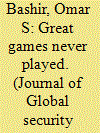

|
|
|
|
|
| Summary/Abstract |
Why do energy-hungry states nevertheless choose not to compete over energy resources? Contrary to the initial expectations of scholars and analysts, major changes in global energy supply have sometimes failed to spark “great games.” This paper presents an explanation for variation in competition, arguing that shifts involving energy touch off competition only when they affect political power between rivals in specific ways, when they do not result in beneficial effects that outweigh concerns about power, and when the cost of competition is bearable. After clarifying the concept of power in the energy issue area, the article applies this explanation to US decisions during four major post-Cold War developments in oil or natural gas, illustrating why American decision-makers chose to engage in competition with Russia or China in only half of these instances. The article concludes with implications for US grand strategy.
|
|
|
|
|
|
|
|
|
|
|
|
|
|
|
|
| 7 |
ID:
156247
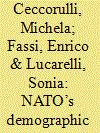

|
|
|
|
|
| Summary/Abstract |
Russia, cyberterrorism, Da’esh are among the most quoted challenges to NATO mentioned in the organizations’ documents, specialized literature and newspaper articles. How about a subtler, less striking but real challenge like demographic change? Demographic trends are increasingly recognized as relevant in understanding international politics and particularly international security, but only seldom taken into consideration when dealing with NATO’s future challenges. NATO, hence, suffers from the limits of a political–military institution designed for a post-Second World War demographic and security context that is changing drastically – and is expected to change even more in the foreseeable future. The aim of this article is to explore the current and projected demographic trends at the global level, evaluate their security implications and then draw inferences for the challenges and opportunities that will arise for NATO out of the sketched scenarios. Based on this analysis, we posit that the Alliance is facing a demographic paradox, whereby it is increasingly unable to cope with external demographic challenges because internal demographic changes are weakening the cohesion needed to provide an effective response.
|
|
|
|
|
|
|
|
|
|
|
|
|
|
|
|
| 8 |
ID:
156243
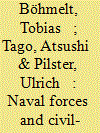

|
|
|
|
|
| Summary/Abstract |
While the importance of navies for international affairs is widely documented, their influence in domestic politics remains less understood. This research offers a comparative account of how states’ naval forces affect civil-military relations. Does the navy matter for military attempts to seize government power? Urban populations, especially middle class elements in the capital city, are more capable (if willing) of creating opportunities for the armed forces to overthrow the government. Recruitment practices and the location of bases often link naval forces more strongly to these societal elements. Thus, countries with a larger navy in relation to the army could be more vulnerable to a coup d’état. The empirical findings, based on the analysis of time-series cross-section data on a sample of all states between 1970 and 2007, provide strong support for this proposition. Several robustness checks further increase our confidence in the results.
|
|
|
|
|
|
|
|
|
|
|
|
|
|
|
|
| 9 |
ID:
156239
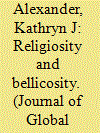

|
|
|
|
|
| Summary/Abstract |
Are states with religiously committed citizens more likely to initiate conflict than states with less committed populations? This article builds upon findings within the literature on American politics that link individuals’ levels of religious commitment to their attitudes about foreign policy, and it tests whether the implications of these findings have cross-national applicability and explanatory power for interstate conflict. Using a novel, robust measure of the proportion of a state's population that is religiously committed, as well as monadic and dyadic statistical models, the analysis finds widespread connections between religious commitment and bellicose state behaviors. The results show that states with more religiously committed populations demonstrate higher propensities for initiating conflict with other states. This relationship is most severe when both states in a dyad have high levels of religious commitment, while it does not appear to be conditioned by whether majorities within the populations of each state ascribe to different religious traditions. This project advances knowledge about both the role of religion in international relations and conditions for interstate conflict, emphasizing the relevance of domestic cultural factors to global politics.
|
|
|
|
|
|
|
|
|
|
|
|
|
|
|
|
| 10 |
ID:
156249
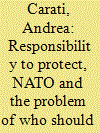

|
|
|
|
|
| Summary/Abstract |
One of the most challenging issues concerning the doctrine of the Responsibility to Protect (R2P) is ‘who should intervene’ in case of gross violations of human rights. After the intervention in Kosovo in 1999, the North Atlantic Treaty Organization (NATO) has been increasingly considered a legitimate actor to fulfil the duty to intervene for humanitarian reasons. In 2011, the first military intervention inspired by the R2P in Libya reinforced the appreciation of NATO as a viable enforcer of the doctrine. The paper problematizes the idea that NATO could be a straightforward solution to the problem of who should intervene. NATO's constitutive nature comprises aspects that are at odds with R2P as a normative scheme. In this regard, the paper delves into three aspects: (a) the controversial issue of ‘delegated authority’ from the UN to NATO; (b) the tension between the universalistic character of the R2P and the particularistic nature of NATO and (c) the military nature of the alliance and its consequent focus on security/military considerations that rarely, or just occasionally, match with humanitarian concerns. Finally, the paper analyses the intervention in Libya assessing the incongruities between NATO's military operations and the normative framework of R2P.
|
|
|
|
|
|
|
|
|
|
|
|
|
|
|
|
| 11 |
ID:
156241


|
|
|
|
|
| Summary/Abstract |
This article examines the hedging strategies of Iran, Russia, and China. It demonstrates how these deeply dissatisfied states have used strategic hedging to pursue status and security: specifically, through local revisionism that does not jeopardize their ability to participate in the international system or trigger interstate war. The case studies show how these states have maintained this balance during three of the biggest interstate crises of the twenty-first century so far: confrontations over Iran's nuclear program, Russia's destabilization of Ukraine, and China's maritime operations. Each case juxtaposes these states΄ regional assertion of power with their efforts to bargain with the system hegemon. The evidence shows that despite ostensibly revisionist maneuvers, none of these states want to fight the US or to break with the global system. Rather, each has executed its revisionist gambits as part of a wider hedging strategy, calibrating their level of aggression to the tolerance of the US.
|
|
|
|
|
|
|
|
|
|
|
|
|
|
|
|
| 12 |
ID:
156248
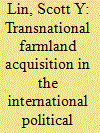

|
|
|
|
|
| Summary/Abstract |
A new wave of transnational farmland acquisition recently emerged, giving rise to two questions: What are the approaches in this wave of farmland acquisition and have relevant regulations been created for governance? Theories of international political economy are used to analyze the acquisition race, with two findings. First, grain-importing countries in Asia and the Persian Gulf region tend to use economic nationalism to conduct acquisition. Developed countries in the West tend towards liberalism, with market interests being the driving force behind acquisition, and the civil society of host countries in the South generally embrace both Marxism and liberalism, hoping to evaluate the acquisition process from perspectives of human rights and responsible farmland investment. Second, the existing governance regulations tend to favor investor countries’ interests, leaving host countries’ food security insufficiently protected.
|
|
|
|
|
|
|
|
|
|
|
|
|
|
|
|
| 13 |
ID:
156242
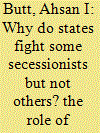

|
|
|
|
|
| Summary/Abstract |
Secessionist wars are considered one of the most important sources of violence in international politics. Scholars studying why states adopt coercion or concessions against secessionists have only pointed to domestic factors, such as ethnic heterogeneity or political institutions. By contrast, I argue that state strategy is determined by the external security implications of the secessionist movement. Because secession entails a large and rapid shift in the international balance of power, it generates a commitment problem: Only a state sanguine about future threats can be conciliatory to separatists. Conversely, if the state fears war after border changes, either against the seceded state due to deep identity divisions with the ethnic separatists, or an existing regional adversary due to the war-proneness of its neighborhood, it will adopt coercion. If states choose to coerce, their calibration of violence depends on secessionists’ external support; for materialist and emotional reasons, the more third-party support, the more violent the state. Using data from more than 110 interviews, diplomatic papers, and news archives, I test the theory first by contrasting Czechoslovakia's Velvet Divorce with Israeli intransigence on Palestinian statehood at Oslo, an outcome existing theories would not predict, and then by examining internal variation in India, the country most beset by separatism, across three states in the 1980s: Assam, Punjab, and Jammu and Kashmir.
|
|
|
|
|
|
|
|
|
|
|
|
|
|
|
|
|
|
|
|
|